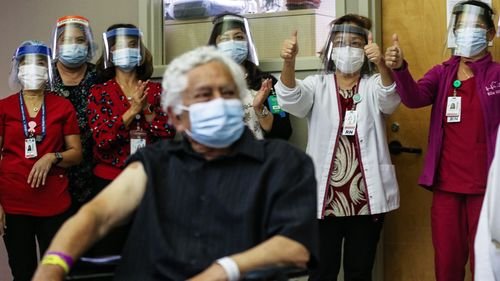Reasons for cautious optimism amid Covid-19 crisis: ‘The news about the future’ is really promising

A version of this article first appeared in the “Reliable Sources” newsletter. You can sign up for free right here.
The prevailing news about Covid-19 was so bleak for so long. But the facts have changed — faster, perhaps, than the major news narratives have changed.
The vaccines are showing “spectacular” results, to borrow a recent phrase from Dr. Anthony Fauci. Hospitalizations are declining. The variants are a curveball, but it “just doubles down the idea that we need to get people vaccinated as quickly as possible,” CNN’s Dr. Sanjay Gupta says.
The new administration is activating what it calls a “whole-of-government response.” Government experts are freely speaking to the press and the public. Conspiracy theories aren’t being retweeted by the president anymore. Cautious optimism is warranted at this point — with an emphasis on the caution, to be sure, but without losing the optimism.
“The news about the future” is really positive
Some observers have been pointing to a disconnect between the data and public discussion of the pandemic.
“For most of us, the best thing is to stop doomscrolling over detailed discussions about what drops in neutralizing antibody titers etc mean from Twitter threads,” Zeynep Tufekci wrote last week. “We gotta get through the grim winter — up your cautions — but the news about the future has been really good for months.”
That news about the future is primarily about the effectiveness of the vaccines.
David Leonhardt of The New York Times wrote Monday, “The news about the vaccines continues to be excellent — and the public discussion of it continues to be more negative than the facts warrant. Here’s the key fact: All five vaccines with public results have eliminated Covid-19 deaths. They have also drastically reduced hospitalizations.”
Sometimes the detailed data from clinical trials obscures the big point, which is that the vaccines are largely effective at preventing symptomatic disease — “which means fewer hospitalizations, and subsequently, fewer deaths,” as CNN Health exec producer Ben Tinker told me Wednesday night. “Additional preliminary data on the AstraZeneca vaccine — developed in conjunction with the University of Oxford — suggest it may also be effective at preventing transmission of the virus. That would be even more welcome news in the urgent effort to stem the tide of new cases.” Every update just underscores the need to get more doses to more people ASAP…
WH briefings three times a week
Technical difficulties plagued the first briefing by the WH Covid-19 response team on January 27, but since then the videoconferences have been working well. Covid-19 chief Jeff Zients, Fauci, CDC Director Dr. Rochelle Walensky and other officials held briefings last Friday and all three weekdays so far this week.
Zients said Wednesday: “I hope that, five briefings in, we’re starting to establish a pattern of providing the American people with the facts they need about the crisis and our response, driven by our experts and scientists.”
Lockhart’s view
Quoting from Clinton era WH press secretary Joe Lockhart’s new column for CNN.com: “Something unusual is happening in Washington, DC: Media briefings, and lots of them. Real live briefings where the press gets to ask questions to the administration and spokespeople and senior officials actually answer them.” Read on…
Partisanship drives vaccine hesitancy
Of course, the scale of the crisis is mind-boggling. As Zients said, “vaccinating everyone in America is one of the greatest operational challenges we’ve ever faced, and we will not stop working until this mission is complete.”
Right now demand for the shot greatly exceeds the supply. But at some point there will be a gap between supply and demand. New polling from Monmouth University finds that 50% of Americans plan “to get the Covid vaccine as soon as they are allowed,” and that 6% already have. (The latter figure is already outdated since more than a million doses are being administered every day.) Monmouth found that “another 19% say they would prefer to let other people get it first to see how it goes,” and “24% say it is likely they will never get the vaccine if they can avoid it.”
>> “Reluctance to get the vaccine is driven more by partisanship than any single demographic factor,” the polling institute’s director Patrick Murray commented. “It says a lot about the depth of our partisan divide that it could impact public health like this.”
>> Media Matters senior fellow Matt Gertz: “Steve Doocy should get the COVID vaccine live on-air.” He has other suggestions for Fox…
One death per minute?
As every “Rent” fan knows, there are 525,600 minutes in a year. There may also be that many deaths from Covid-19 in the United States by March. Newsletter reader H. Steven Moffic, MD made this point to me on Wednesday. His latest contribution to Psychiatric Times is about the death-per-minute measurement and the “prolonged grief of Covid-19.”
>> Per CNN’s Ben Tinker, “an ensemble forecast published Wednesday by the CDC now projects there will be 496,000 to 534,000 coronavirus deaths in the United States by February 27.”
>> On Wednesday the US death toll surpassed 450,000, according to data compiled by Johns Hopkins. The US went from 400,000 to 450,000 deaths in a span of just 15 days. Since deaths are a lagging indicator, “the recent decline in hospitalizations gives us hope that the number of deaths should start to decrease in the coming weeks,” Walensky said Wednesday.